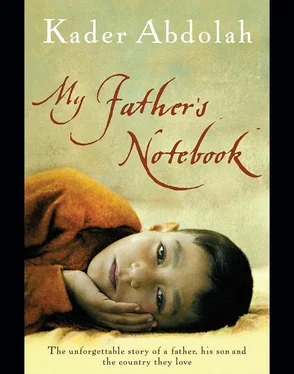We embraced. “ Salaam , comrade! Salaam !” It was as if there’d been an earthquake and your friend had been pulled out of the rubble without a scratch.
In a café, he told me his story. The party had been wiped out. Nothing was left of the leadership. We no longer had a national committee. A small central committee had been formed, but we’d have to work in total secrecy. Nevertheless, we needed to show the imams that the movement was still alive.
The next day I was informed of my new duties. The party no longer had a printing press. My job would be to publish the party newspaper, though on a smaller scale. It was up to me to make the arrangements.
What arrangements? There was almost nothing to arrange. All we had was an old stencil machine, stashed away in a salvage yard somewhere outside Tehran.
I was to fetch the machine, repair it and get to work.
Where was I to keep the thing?
At home, in my own flat. Safa and my little girl would serve as a front.
Involving my family in the printing operation was not the wisest thing to do, but it was pointless to refuse or protest. Who would I protest to? Myself?
I was to run off 3,000 copies of a news sheet once a week and deliver them to another contact person. Under normal circumstances, this would have been impossible, but these weren’t normal circumstances. We were ready to fight the clerics with our bare hands.
Still, the hardest part was yet to come. Freedom fighters place great demands on themselves when the need arises. In my case, the hardest part would be having to work out of my own flat.
I considered the drawbacks. How would I get that heavy machine up to the fifth floor without being seen? What if someone came out of one of the apartments and asked, “What’s that?” Even if I got it safely upstairs, an antiquated machine like that was bound to make a lot of noise.
What I dreaded most, however, was having to tell my wife about it when she came back from Kermanshah.
I briefly fought an inner battle. I had to choose or, rather, I had no choice. I chose the movement, which meant leaving my family in the lurch. Setting aside my doubts, I phoned my wife and told her that we wouldn’t be able to see each other for a long time.
Women have always surprised me. I thought my wife might object, might say it was out of the question, that she wanted to come home and that I couldn’t involve everything and everybody in my wild dreams. I thought she’d say, “Forget it, I’m coming home.”
But she didn’t. I sensed that she was crying. For whom? Herself? Our daughter? She had the right to a normal life. And yet I knew my wife was also crying for me, since she was the only witness to my dreams.
My wife was a normal woman who embraced life and wanted a peaceful existence. I couldn’t give her that. Not then, at any rate. Later on I did, when she moved to Holland, but by that time she’d paid a high price: she would never be able to go home again.
• • •
I drove out of town to pick up the stencil machine. After about an hour I arrived at the salvage yard, where various people were poking through wrecked cars in search of parts. Since I had no reason to go into the office, I walked directly to the shed at the far end and pushed open the door. It was dark inside. I lit a match and turned on the light.
The stencil machine was in the corner, covered with a thick layer of dust and grime. I wrapped it in an old blanket. It was too heavy to lift, so I dragged it across the ground to my car.
What were we doing? What was I doing? This wasn’t an act of resistance — it was a suicide mission. At any moment, a couple of men from the secret police might stop me and yell, “Hands up!”
I was reminded of Don Quixote. He tilted at windmills; I wrestled with my stencil machine.
When I reached the car, I looked around for help. A young man happened to be passing by.
Together we lifted the machine and put it in the trunk. Then I locked the car and walked to a teahouse at the edge of the village. After all, I couldn’t carry the thing up to my flat in broad daylight.
Late that night, when everyone was in bed, I hoisted the heavy machine onto my back and staggered up to our apartment, one step at a time. It was risky. I was terrified that one of our neighbours would open a door and see me on the stairs, but no one did.
In the bedroom, I eased the machine off my back and set it down on the bed. I tried to straighten up again, but couldn’t. Movement of any kind was out of the question, so I spent the next quarter of an hour bent over, on my knees, until the pain subsided.
To this day I’m still plagued by backache. Sometimes, when I’ve been sitting at my computer for too long, I feel a jab of pain when I try to stand up. I have to hunch my shoulders, then slowly straighten my back.
I put the stencil machine in the wardrobe and tried to insulate it so the noise couldn’t be heard outside. It didn’t help. The entire wardrobe jiggled and bounced, and the din echoed around the room.
The whole thing was a disaster. The machine hadn’t been designed to run off so many copies. It might do for a country schoolhouse that needed only twenty or thirty copies a week, but not for me.
The paper got stuck, the ink leaked and the roller squirted ink all over the place. The stencil tore easily, and whenever that happened, I had to type up a new one.
I could put up with all of this, but not with the racket. It was the kind of noise that would make people ask, “What’s that man doing in there?”
How long could I turn on the radio or the vacuum cleaner to mask the noise? I’d print a couple of hundred pages, then run out to see if the neighbours had noticed anything. Day after day I hid behind the curtains, watching until our next-door neighbour had left for work and his wife and their two children had gone off for their daily visit to her mother. As soon as they were gone, I’d race to the wardrobe and begin stencilling like mad in an attempt to catch up on the backlog.
Safa and I had deliberately kept our contact with the neighbours to a minimum. Still, they might wonder where she was: “Hey, we haven’t seen the wife for ages,” or “What’s our neighbour up to, he’s at home alone a lot of the time.”
During the day, I closed the curtains and pretended I wasn’t at home. Sometimes I didn’t leave the flat for days.
If I knew the neighbours were away, I ran the machine on electricity, but in the evenings I had to work it manually. I switched on the nightlight and churned out copies until morning. Then I delivered the news sheets to my contact person and received the next assignment.
Buying paper and ink was also a dangerous undertaking. Paper had become scarce during the war and the mullahs had seized control of printing supplies. You could only buy them in a special store in the mosque, which also sold vital foodstuffs, such as rice, sugar, cooking oil and tea. Not only did your request have to be approved by your local imam, but your purchase was supervised by a couple of bearded fundamentalists.
So, I bought paper and ink on the black market, where you often paid ten times the going rate.
The first two months, the printing went well and I finished the news sheets on time. Fear, however, gradually took hold of me. I slept badly. I had terrible nightmares and woke up every morning with a headache.
We were banging our heads against the walls of the mullahs, presumably to let them know that we were still alive and not afraid of them. And yet I was afraid. Not of being killed, but of having them break my spirit so much that I’d be prepared to kneel before them.
In reality, our resistance was having little effect. I no longer believed in what I was doing, and that scared me, too.
Читать дальше












